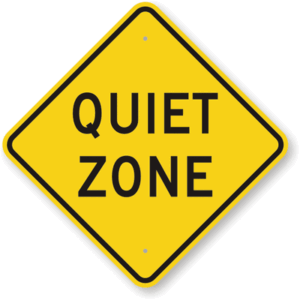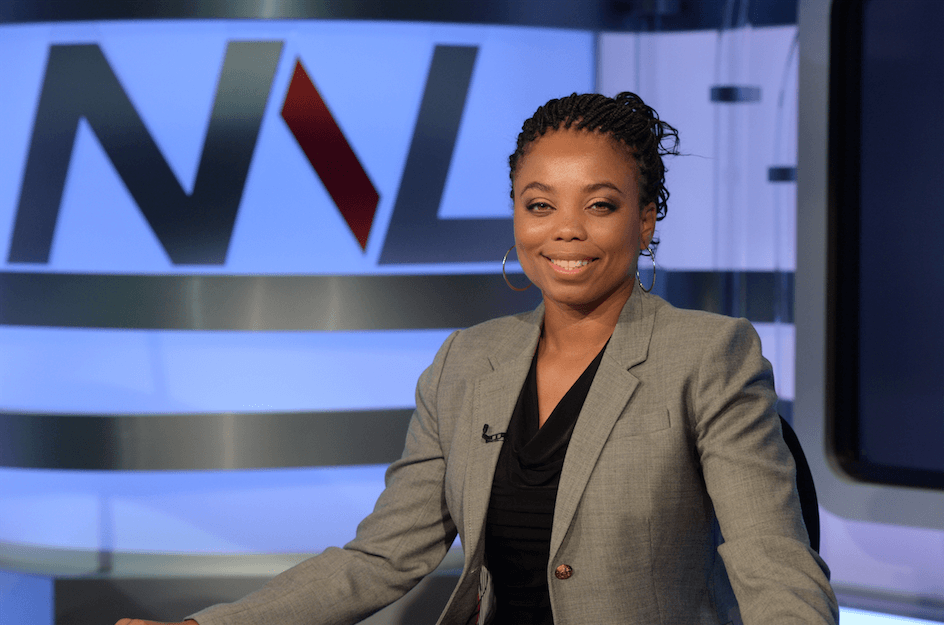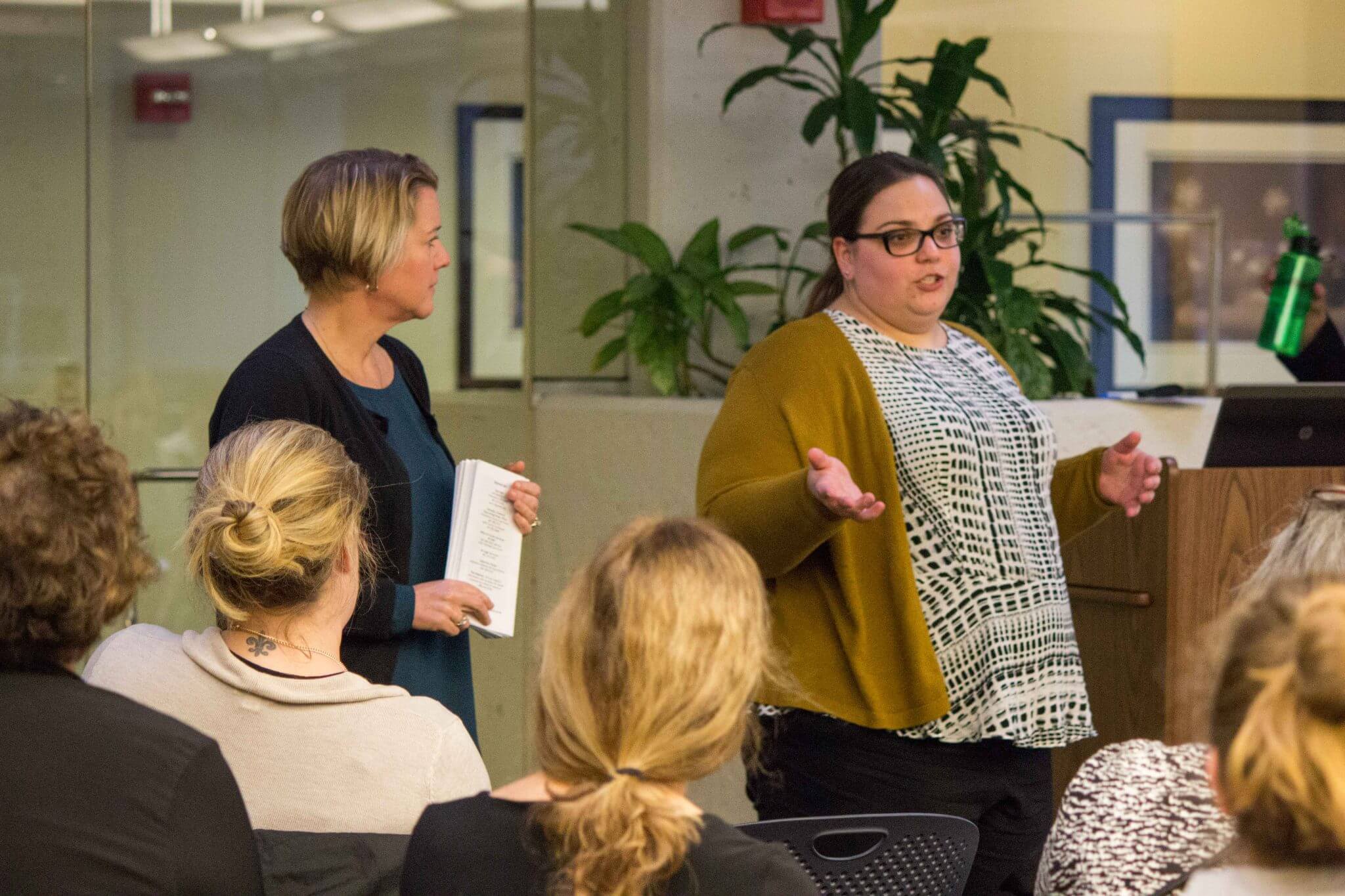Tag: Bridget Blain ’19
End the Silence on Sexual Assault
by The Cowl Editor on October 19, 2017
Opinion

by Bridget Blain ’19
Opinion Staff
The accusations that have been made against Harvey Weinstein by more than a dozen women over the past two weeks are very horrifying and, unfortunately for many, not too surprising. Weinstein’s reputation of sexually harassing and assaulting young women in the entertainment industry has often been referred to by various journalists as “Hollywood’s biggest open secret.”
The article that officially broke the news of Weinstein’s history with women, published by The New York Times on Oct. 5, is even titled, “Harvey Weinstein Paid Off Sexual Harassment Accusers For Decades.”
Well-known, A-list celebrities such as Gwyneth Paltrow, Ashley Judd, and Angelina Jolie have come forward with their own disturbing experiences with Weinstein, showing that no woman in the industry was safe from Weinstein.
It is clear that while many people knew what was happening to these young women, Weinstein’s power in entertainment combined with the prevalence of victim blaming prevented dozens of women from coming forward until years later.
With every new allegation that arises, it becomes clearer just how severely Weinstein was abusing his status. It is obvious why none of these women came forward at the time, as Weinstein was in control of their careers and reputations.
What is also disturbing is the many men in Hollywood who knew what was happening to these women, but remained silent, such as Manhattan District Attorney Cyrus Vance Jr. who held a recording of his past assaults. Weinstein’s influence in the entertainment industry created a culture of silence, both in the women who had these awful experiences with Weinstein and in the men who knew about them.
Weinstein knew the power he had over the careers of these women and abused it as much as he could. If these are the stories and allegations that are just being brought forward now, it is worrisome to think about what else, or who else, has been silenced over the years.
The culture of silence surrounding sexual assault is not only a problem in the entertainment industry, but on college campuses as well. Nearly 70 percent of sexual assaults that happen on college campuses are not reported and the recent events surrounding Weinstein clearly show why. For example, plenty of actors and others in the entertainment industry have come forward in support of Weinstein, suggesting that the claims made by these actresses are lies.
It makes sense that college students who want to come forward with similar experiences are afraid of not being believed.
Watching the details of Weinstein’s alleged sexual assaults unfold has provided a clear example of why survivors of sexual assault do not immediately come forward. Abusers such as Weinstein often use their power to silence those around them.
The responsibility of telling the truth should not be placed solely on survivors of sexual assault. Those who know what has happened or continues to happen, such as Weinstein’s assistants or male actors who knew what was happening to their female co-workers, also have a responsibility to break the silence.
More often than not, college students are just as apprehensive about coming forward as the actresses assaulted by Weinstein were.
We as a society need to learn better ways to support those who want to come forward with their experiences and also how to prevent abusers from using their power to silence everyone around them. Looking at the case of Weinstein is a good a place to start.
Tangents & Tirades
by The Cowl Editor on September 28, 2017
Opinion
Let Commuters Park on Campus
This may not come as a shock, but there is a very small percentage of student commuters at Providence College—three percent to be exact. Perhaps there is a reason for this minute statistic. Commuting to any college is difficult, but this is especially true at PC. Previously, parking was already a highly debated topic. However, with the construction of the Arthur F. and Patricia Ryan Center for Business Studies, a significant amount of student parking was taken away. Commuters are able to park in three lots on campus: Anderson Garage, Glay Lot off of Eaton Street, and Fennel Hall Lot. Although this is a generous amount, the issue is that two of these lots are also used for resident students. Therefore, because these students live on-campus, their cars are rarely ever moved, especially during the day while students are in class. How are commuting students supposed to park when there is no turnover?
The only way around this is to dedicate a parking lot solely to commuters. The Anderson Garage is also often full with faculty and staff cars because it is a much shorter walk than parking in the Fennel Lot. Parking on the street is another option, but everyone else has already thought of this, and there are usually no spots left. There is always the option of taking an Uber to school, but doing this round-trip every day gets to be very costly. After doing the math, it actually equates to more than the full-time, year-round parking pass. Even though there is a very small amount of students who live more than a half a mile away from campus, we do exist. So, PC, please hear our message. This way I can avoid being late to class (again and again) after driving all over campus for a half hour to find a spot —and even then I sometimes don’t and have to park on an insecure side-street.
-McKenzie Tavella ’18

Respect the Quiet Zone
For those Providence College students who venture to the Phillips Memorial Library to get their studying done, I have a message for you all: keep the “Quiet Zone” quiet.
On many nights, I have come to Club Phil to escape the noise of Slavin, the commotion of my apartment, or the disruptions of the Ryan Center for Business Studies—only to find myself just as distracted by other students talking, texting, and using their phones in the “Quiet Zones” of the library.
While these noises and distractions may be acceptable in certain parts of the library, the “Quiet Zone” is not one of them.
The labels of the “Quiet Zones” throughout the library promise students sitting in these areas the peace and silence they deserve to study and focus.
But far too often, these labels go ignored as more and more students sit wherever they want, use cell phones with complete disregard for those around, and watch videos on their laptops, without headphones, at noise levels far too high for any library setting.
Students wishing to talk and text while studying need be more cognizant and respectful of where they choose to study. Library staff similarly should be more aware of the noise levels in these areas and not hesitate to enforce them through friendly reminders (or even a “Shh” now and then).
As a place of reading and study, the library should first and foremost promote an environment conducive to students’ learning and focus, and this starts with “Quiet Zones” that are actually quiet…
-Sarah Kelley ’18
Too Early For Christmas
Now that the end of September is near, excitement for colder weather and fall festivities is in full swing. It seems that every month in the fall and winter has a holiday that those who celebrate wait for in intense anticipation. But there is something strange about getting too excited for a holiday too soon.
For example, there are few things more disheartening than walking into a store in July and seeing the back to school section set up and fully stocked. It is also not uncommon to walk into a store in September and see Halloween or even Christmas decorations on display.
These premature holiday displays this time of year feel just as unnecessary as back to school displays in July. There is no need to the rush the anticipation of a certain holiday or event. It becomes more and more difficult to appreciate the present moment when holidays that are months away are constantly being advertised. No one needs to be thinking about how they are going to decorate for Halloween in August, or even in September.
There is plenty of time to decorate and get excited about holidays as they become closer. When the anticipation begins months in advance, it usually either becomes too hard to maintain or the expectations for the holiday become too high.
There is nothing wrong with preparing and being excited for a celebration, but no one needs to see Halloween or Christmas decorations every time they enter a store months and months ahead of time. Whatever month or season we are in should be appreciated while it is happening, not spent in anticipation for a day in the future.
-Bridget Blain ’19
Free Speech or Hate Speech?
by The Cowl Editor on September 21, 2017
Opinion

by Bridget Blain ’19
Opinion Staff
Throughout the election and now several months into the presidency of Donald Trump, the current political climate has often been compared to living in a dystopian novel, such as 1984 or Fahrenheit 451.
Trump’s reactions to being criticized for anything from his policies to his tweets often bring up the topic of censorship. The current battle between ESPN anchor Jemele Hill and Donald Trump has once again brought up issues of the right to free speech.
On Monday, Jemele Hill tweeted “Donald Trump is a white supremacist who has largely surrounded himself w/ other white supremacist.”
Unsurprisingly, Hill’s tweet immediately caused controversy and the Internet erupted with differing opinions.
Many praised Hill for being unafraid to voice her opinion while others called for her to be fired. Hill’s association with ESPN has called into question whether an employee of such a large and influential company had the right to express her own personal opinion about the president.
This controversy has brought into question the politics of a corporation like ESPN and their political neutrality. Politics are unavoidable in America, and corporations and people with large platforms do have a responsibility to use their voices for the greater good.
As an employee of ESPN, Hill represents the corporation, but does that mean she must censor herself and keep her views hidden? Hill’s tweet was not a hate speech or threatening in any way. Hill does represent ESPN, but ESPN also has a responsibility to respect Hill’s opinions and her freedom to use her voice.
Colleges also face the issue of freedom of speech and censorship, not only with their own professors but speakers who are invited to speak on campus.
Recently, Providence College has experienced this issue. In 2013, a lecture scheduled to be given by Dr. John Corvino on campus titled “The Meaning of (Gay) Marriage” was cancelled. This decision, as with Hill, brought forth both criticism and praise. Providence College is not the only college that has had issues with invited lecturers.
At University of California Berkeley, for example, nine people were arrested this past Friday during a protest against Ben Shapiro, a conservative writer, giving a lecture on campus. Colleges do have a large responsibility when it comes to deciding who should give lectures on their campuses, but it is also important to remind students the possible benefits of hearing opinions that differ from theirs.
This also brings the division between free speech and hate speech into play. A lecturer who is known to promote hate speech and offensive or harmful views should not be speaking on a college campus.
Hate speech has no place anywhere and is never appropriate. Just because a lecturer comes to a college campus and presents his or her view does not mean the college is fully in support and agreement with it.
Similarly, Jemele Hill stating her opinion on her own Twitter account does not mean that everyone working at ESPN has the same views. Hill was not promoting hate speech nor was she presenting herself as a danger to anyone. Hearing both sides is essential to fully understanding an issue and creating important dialogue.
The fact that ESPN did not fire Hill does not mean the company supports her, just as a college inviting a lecturer to their campus does not communicate that the college itself is in agreement with the lecturer. As long someone is not hateful or threatening, his or her voice has a right to be heard.
Tangents and Tirades
by The Cowl Editor on September 14, 2017
Opinion

What Did We Make Taylor Do?
It has been virtually impossible to avoid Taylor Swift’s music and personal drama for years and these past few weeks have been no exception. After being infamously targeted by Kim Kardashian West on Snapchat last July, Swift essentially disappeared from the spotlight.
Many wondered how she was going to break her silence to share her side of the story. Her first single, titled “Look What You Made Me Do,” was supposed to do just that. Swift’s new song appears to be her revenge plot against those she feels have damaged her reputation, but sounds more like a parody of songs about retaliation.
After listening to this song for the first time, I was left with questions that have yet to be answered. For example, the chorus makes no sense. Swift simply repeats the phrase “look what you made me do,” but what exactly did she do? Who is she talking to on the phone when she proclaims that “the old Taylor can’t come to the phone right now?” Why does that part of the song even exist?
Swift portraying herself as the victim who intends to exact revenge against her enemies is nothing new. She has been singing about getting back at boyfriends or friends who have wronged her since the beginning of her career.
“Look What You Made Me Do” is a predictable response to her recent portrayal in the media. Did anyone really think Swift was going to release a song called “Kanye and Kim were right, I was wrong?” Sadly, we will have to wait until November to find out if Swift is willing to provide us with any more details of her public feuds. Until then, we can only continue to speculate and wonder what exactly her enemies have made her do, just like she expects us to.
-Bridget Blain ’19
Package Pandemonium
Students walking up from the business school last Monday and heading for a quick lunch at Ray may have found themselves arrested by the sight of a rather copious gathering of humanity outside the mailroom. The line for package pickup stretched out the door, up the steps, and at some points, nearly breached the entrance to the mailbox area. The slow-moving line and the general sense of disorder caused by the influx of packages demonstrates that a new system for student pick-up of packages would save serious time and stress.
Some students, who arrived at peak hours to retrieve their packages, could have counted their wait times at around 45 minutes. Some of these same students waited only to be told that their packages were unable to be located by mailroom staffers. Such are the breaks when there is only one worker to find a package, swipe the student’s ID, and move on to the next customer in a seemingly unending line.
It would be rational for the mailroom to extend its hours during the high-volume periods at the beginning of the semester, when students are flocking to the Internet to order books and dorm room decorations. Perhaps a more rigid scheduling system that ensures student workers will show up would help make the experience of getting a package more endurable. Unless these or other changes are made, students should brace themselves for long delays to get their stuff.
-Kevin Copp ’18
Black Women Matter Too
“Nobody’s free until everybody’s free,” said Fannie Lou Hamer, an activist in the Civil Rights movement. She spoke these words at the Democratic National Convention in 1964, but 53 years later they still ring true.
While some citizens may insist that we have already achieved racial and gender equality as a nation, the fact remains that there is still much more progress to be made.
For decades—centuries even—black women have endured much to garner the same respect and attention to their fight for justice, a cause that is all too familiar to white women of privilege. For the most part, America recognizes women’s struggles. But the struggles black women face are immeasurably overlooked.
As Charlene Carruthers said at the Black Women and Girls Symposium, “We are fighting the same battle today as we were 10 years ago.” The push for justice for black women did not end with the Civil Rights movement, and it certainly will not end with the modern feminist movement.
We cannot talk about equal pay without talking about how black women are paid 63 cents for every dollar white men are paid. We cannot talk about women’s portrayal in the media without talking about the way in which black women are underrepresented.
Feminism that does not include black women is not feminism in its truest and most progressive form.
-Hannah Paxton ’19
New Semester, New Goals
by The Cowl Editor on August 31, 2017
Opinion
by Bridget Blain ’19
Opinion Staff
The beginning of a new school year bears close resemblance to the beginning of a new calendar year. The night before returning to the Providence College campus can often feel like its own New Year’s Eve celebration. The crowded gym in January becomes the crowded library in September.
Just like the beginning of a new year, the beginning of a new semester often means setting goals for ourselves and feeling motivated to see them through. As important as it is to set goals and motivate ourselves for a new semester, it is just as important to be realistic and have patience with ourselves.
During summer break, classes and homework are the last things on anyone’s mind. But as the first day of class approaches, reality hits. With every textbook we have to pick up from the bookstore comes a new expectation we place on ourselves to succeed.
There is nothing wrong with setting goals when starting a new school year; it is a great motivator and can help students get their priorities straight. But the most important part of setting goals is being reasonable and kind to ourselves.
Just as many students realize their New Year’s goal of going to the gym every day is unattainable by mid-January, so too will they recognize that expertly balancing a 4.0 GPA, a social life, and extracurriculars is not as practical as it may seem.
The long list of expectations college students create for themselves at the beginning of a new semester is often hard to stick to. Goals that are just too impractical, such as joining every club and getting straight A’s, can often end in frustration or disappointment.
Calling a certain goal unrealistic is not to say that it could never be achieved or that the person who set it could not accomplish it. It seems that too often students do not know what they are capable of and end up surprising themselves when they really try to do something they have set their minds to.
However, it is important to pace ourselves and not to be too hard on ourselves throughout the semester if we do not accomplish exactly what we wanted to.
Too often PC students get caught up in comparing their accomplishments to the accomplishments of their friends or even to the success of peers they come across on social media.
Everyone wants to be the best version of themselves, and the beginning of a new semester is the perfect time to try to become that person. Just remember not to get caught up in the pursuit of perfection, because that is one goal no one will ever achieve.
Preying On The Privileged
by thecowl.opinion on May 4, 2017
Opinion

by Bridget Blain ’19
Opinion Staff
Fyre Festival made its debut this weekend and has quickly become one of the most discussed events of the spring, but for all the wrong reasons. What was promised to be a luxurious two-weekend getaway to the Bahamas filled with music and models quickly turned into a colossal disaster. And as bad as it may seem, it is hard to feel sympathy for people who had $12,000 in extra cash lying around and spent it on tickets to a suspicious music festival.
Every aspect of Fyre Festival seemed to be purposefully catered to a certain demographic: the young and privileged. There were also several signs that should have warned someone who was about to spend thousands of dollars on a ticket to rethink their decision.
Let’s start with the price tag. The prices of tickets ranged from $450 to $12,000. Obviously, music festivals are not cheap, but for reference, the most expensive ticket package for Coachella is $899. Paying almost $900 to spend the weekend at a music festival seems ridiculous to the majority of people, but spending over $12,000 to attend a festival is just outrageous.
People are free to spend their money however they please and those who purchased tickets did not deserve what Fyre Festival turned out to be, but it seems as if that $12,000 could have been used in a better way. Was a music festival in its first year being astronomically more expensive than the most popular music festivals in the world not a red flag?
Secondly, the advertisements for Fyre Festival clearly catered to extremely wealthy millennials. Advertisements promised an unforgettable weekend with young models and private yachts galore. These advertisements appeared to be more focused on how beautiful the island and models were instead of the music or any other aspect of the festival.
The purpose of a music festival is to bring people with a shared love of music together in an enjoyable and safe environment. The purpose of Fyre Festival, however, appears to be to see how many young and incredibly wealthy people could be convinced to spend thousands upon thousands of dollars on an event that was more about being able to live like a celebrity for a weekend than about music.
One cannot help but wonder how many people who purchased tickets did so because they genuinely wanted to have the experience of seeing performances by the musicians on the lineup or because they simply had two free weekends and an immense amount of money to spend.
Fyre Festival was troublesome from the beginning as it was strictly marketed toward and really only available to the privileged youth. Perhaps it is easier to say now that everything has been revealed, but it is hard to feel sorry for those who put themselves in a suspicious situation so they could spend a weekend reveling in their privilege.
Where Were the Students?
by The Cowl Editor on April 6, 2017
Opinion

by Bridget Blain ’19
Opinion Staff
Members of the Providence College community were invited to attend an open forum to discuss the issue of sexual assault on campus on Tuesday April 4. The forum was also intended to address and explain the recent changes that the College has made to their sexual assault and Title IX policies.
The purpose of a forum is to create an environment where concerns and ideas can be openly shared and discussed. The majority of this forum, however, was spent introducing members of the College faculty and explaining what their role in dealing with sexual assault on campus is.
This was necessary and helpful information to give, but it should not have taken over an hour to do so. But there was a greater issue at hand. There were barely any students at the forum. From the outside, the forum looked full, but in reality, most of those seats were filled by the people who were there to talk about their job. The ratio between faculty members and students was so disproportionate that when students were finally asked to participate in the forum, only three questions were asked.
It is troubling that a forum about an issue that affects so many students in such a significant way was so poorly attended. The administration is not solely at fault for the low turnout. Students cannot be forced to attend and speak at an event that they do not want to go to.
Despite this, the administration does need to take some responsibility. Sexual assault is a serious problem for colleges across the country and it is the responsibility of every administration to make sure students are aware and informed. Sexual assault is an issue that also needs to be addressed by the administration in a much more public way —not through a forum that was barely advertised in the first place. There were no posters around campus, it was not even mentioned on the weekly event cards placed on every table at Ray. Productive discussion between faculty and students is already difficult enough to achieve, let alone when one party is not even being encouraged to participate.
If the administration wants students to take sexual assault seriously, a forum that so few people attended (or even knew about) that spent almost the entire time introducing faculty is not the way to go.
There need to be many more interactive events between students and the administration about not only sexual assault, but also consent and other related topics as well.
Students need to be taught consent along with what to do if an assault does happen, not just one or the other. Discussing with students what their options and resources are after sexual assault occurs is crucial, but does little when in terms of preventing future assaults. The administration needs to incorporate the importance of consent when dealing with the topic of sexual assault on campus. Students who have experienced assault need to know how they will be supported and protected by the College. A poorly promoted forum that was run more like a staff meeting does not accomplish this.
Tangents & Tirades
by The Cowl Editor on March 23, 2017
Opinion

College Snow Days are a Blessing
The annoucement of a snow day always recieves a diverse response across campus. Some Providence College students use snow days as a way to catch up or even get ahead on their work for the week, while others use it as a day off to relax and catch up on some sleep.
Either way, snow days are a blessing and students should be happy to have an unexpected day off.
That being said, students deal with the snow itself in different ways. Some students, typically those who don’t come from the Northeast and have not encountered much snow before, seem to stay away from the outdoors and remain perfectly content with being snowed-in in their dorm rooms. Other, more hardy, students dread the idea of being trapped in their dorms for a day and venture outside to experience the storm.
There is some disagreement amongst students over snow in March. Some seem not to mind the bad weather at all, while others, especially those returning from a warm Spring Break, seem utterly outraged.
However, students likely agree that the best thing about snow days in college is both not having to make up the days missed at the end of the semester and having someone else deal with the issue of shoveling the snow.
– Katherine Opiela ’20
To Nap or Not to Nap?
From the time we are children we are told how important it is to get a good night’s sleep. In kindergarten we were even given a certain amount of time out of the school day to take a nap.
As you get older, however, you have more freedom to decide when to go to bed. By the time you are in college, it is recommended to get around eight hours of sleep every night. As almost every college student can attest, this is virtually impossible.
Between staying up late to finish homework, meeting with study groups, and very necessary Netflix binges, getting a solid eight hours of sleep is just unrealistic. Those who were self-identified night owls in high school are already at a disadvantage. What you considered to be late in high school might now be when you finally start your homework.
Naps become an essential part of the day, but they are also risky. If you take a nap during the day you are risking not being able to fall asleep that night. Or you might take a much longer nap than expected and end up having to stay up all night to prepare for the next day of classes. Even if you have excellent time management skills, it can often be hard to get everything done before you reach the point of not being able to stay awake.
And when you do finally fall asleep, you may fall victim to noisy roommates who do not share the same sleep schedule. Getting the proper amount of sleep is necessary in order to survive, but in college it can be downright impossible.
– Bridget Blain ’19
No More Early Morning Classes
Taking an 8:30 a.m. class doesn’t seem so bad until you’re stuck taking 8:30 a.m. classes Monday through Friday, which is exactly what happened to me. Frankly, I’m not exactly sure why 8:30 a.m. classes exist to begin with. I’m sure I can speak for the majority of college students when I say sleep is something to be treasured and not taken lightly.
While balancing homework, exercise, a social life, and the bare necessities—such as eating and showering—there are simply not enough hours in the day. Therefore, college students have a tendency to go to bed at odd, late hours. An early morning class prevents students from receiving the proper amount of sleep they need on a nightly basis.
According to an article in The Independent, a lack of sleep causes a “decline in cognitive ability; our brains just don’t work properly without sleep. [It] can have severe effects on our performance, ranging from irritability and low mood, through to an increased risk of heart disease and a higher incidence of road traffic accidents.”
So why would Providence College, a well-respected institution that facilitates higher-learning, offer 8:30 a.m. classes knowing what they know about the dangers of little sleep? I suggest changing 8:30 a.m. classes to 9:30 a.m. classes.
The College can still make use of the early hours of the day and it also won’t be as cold later in the morning. In fact, I’m sure students and teachers will be more alert, and it will create an overall better atmosphere for all. I would much rather attend 9:30 am. classes Monday through Friday as opposed to 8:30 a.m. classes.
– Laura Arango ’20
Balancing Protest With Privilege
by The Cowl Editor on March 16, 2017
Opinion

by Bridget Blain ’19
Opinion Staff
This past Wednesday marked International Women’s Day, a day dedicated to remembering the movement for women’s rights and to celebrate the achievements of women all around the world. It also serves as a reminder that gender equality is still not a reality in any country.
After the enormous turnout that the Women’s March had in January, the “A Day Without a Woman” protest was organized to coincide with International Women’s Day, and to bring attention to the importance of female workers to our current socio-economic system.
“A Day Without a Woman” was created to bring awareness to the role that women play in the workplace. The purpose of the protest was to have as many women as possible take the day off from both paid and unpaid work. This tactic, however, immediately drew harsh and undeserved criticism.
Thousands of people took to social media on Wednesday to accuse the protest of only catering to a small amount of privileged women who had the ability to miss a day of work. Countless articles were published that questioned the validity of a protest that seemed to leave out a major portion of the very women it was organized to fight for. While this criticism does have valid points—the majority of women who wanted to participate would be taking a major risk in not showing up to their job—critics are also missing the initial point of the protest was in the first place.
The purpose of any protest is to give a voice to a group being affected by injustice. It is unfair to act as if the organizers of “A Day Without a Woman” were thinking of how to organize a protest in such a way that only privileged, wealthy women could participate.
No, it is not realistic to expect all women to be able to drop everything and take the day off, but there were other ways to participate in the protest. Organizers of “A Day Without Women” encouraged women to do something as simple as wearing the color red that day in solidarity. What is important about a protest is not the economic or social privilege of some people who are participating.
“A Day Without a Woman” was not a perfect protest by any means, but that should not take away from the value of the movement. Taking action and bringing awareness to real and significant issues that affect almost every woman in the world is progress, no matter the privilege of some participants.

